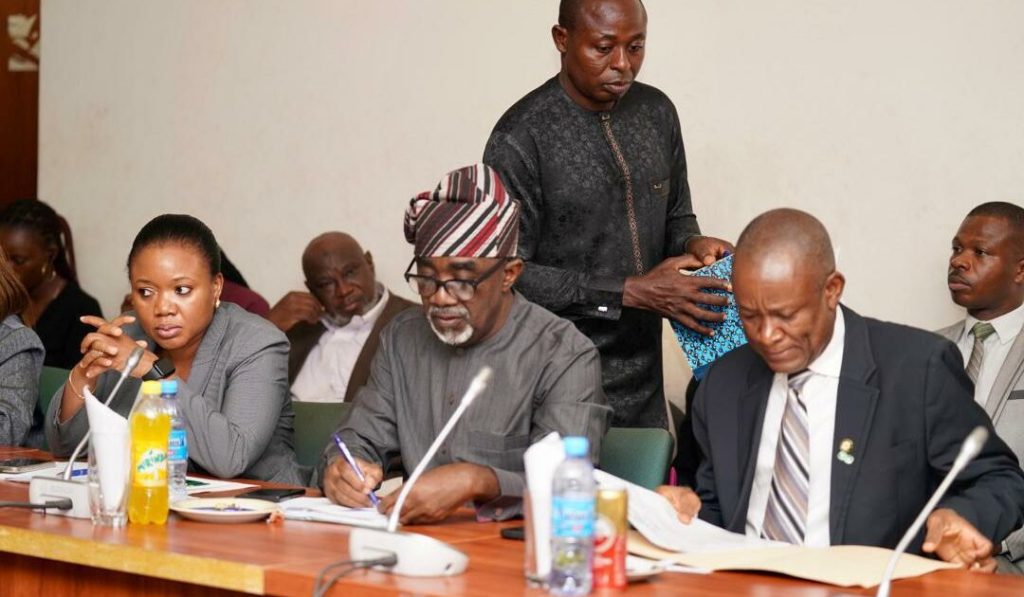Nigeria’s Sugar Sector: A Catalyst for Economic Growth and Rural Development
Nigeria’s sugar industry stands poised to play a pivotal role in the nation’s economic transformation, aligning with President Bola Tinubu’s ambitious vision of a $1 trillion economy. The sector’s significance was underscored during a public hearing convened by the House of Representatives Committee on Industry, focusing on amendments to the National Sugar Development Council (NSDC) Establishment Act. Minister of State for Industry, John Owan Enoh, emphasized the strategic importance of sugar, citing President Tinubu’s recognition of its potential during a recent Federal Executive Council meeting. The sugar sector’s capacity to generate employment, particularly in rural areas, and drive economic development aligns perfectly with the President’s economic agenda. The Nigeria Sugar Master Plan (NSMP) emerges as the roadmap for this transformative journey, promising substantial economic benefits and positioning Nigeria as a major player in the global sugar market.
The NSMP, with its ambitious targets and comprehensive strategies, holds the key to unlocking the full potential of Nigeria’s sugar sector. According to NSDC Executive Secretary, Mr. Kamar Bakrin, the plan’s full implementation could result in annual foreign exchange savings exceeding $1 billion. This substantial saving would not only bolster the nation’s foreign reserves but also reduce reliance on imported sugar, fostering self-sufficiency and strengthening the domestic economy. Furthermore, the NSMP projects significant job creation and a surge in large-scale investments, injecting much-needed capital and stimulating rural development. These combined effects are expected to transform rural communities, creating economic opportunities and improving livelihoods. The proposed amendments to the NSDC Act aim to provide the council with the necessary authority and financial framework to effectively implement the NSMP and steer the sector towards a brighter future.
However, the ambitious goals of the NSMP require significant financial backing and sustained investor confidence. Mr. Bakrin estimates that approximately $4.5 billion in investments is needed to fully realize the plan’s objectives, underscoring the need for a stable and transparent policy environment. He expressed concern over a recent government directive diverting 50% of the sugar levy to the Consolidated Revenue Fund, arguing that this move could jeopardize the NSMP’s funding and undermine investor confidence. The sugar levy, designed as a dedicated fund to support the sector’s growth, plays a crucial role in financing critical initiatives under the NSMP. Diverting these funds could disrupt ongoing projects and deter potential investors, hindering the sector’s progress and jeopardizing the achievement of the plan’s objectives. Maintaining the integrity of the sugar levy is therefore paramount to ensuring the NSMP’s success.
Stakeholder consultations reveal diverse perspectives on the proposed amendments and the future direction of the sugar sector. The National Agency for Food and Drug Administration and Control (NAFDAC) cautioned against potential regulatory overlaps, highlighting the need for clear delineation of roles to avoid duplication and ensure efficient oversight. Representatives from major industry players, including BUA Group and Flour Mills of Nigeria, emphasized the importance of policy consistency and a supportive regulatory environment to attract and retain investments. BUA Group showcased its commitment to the sector with its extensive 50,000-hectare sugar plantation, while Flour Mills of Nigeria highlighted its ongoing efforts to increase local production at its Golden Sugar Company in Niger State. These industry perspectives emphasize the crucial role of private sector participation in driving the growth of the sugar sector.
The House Committee on Industry, led by Chairman Enitan Dolapo Badru, pledged an inclusive amendment process, aiming to empower the NSDC to effectively fulfill its mandate. Balancing the need for robust regulatory oversight with the imperative to foster investor confidence remains a key challenge. Addressing concerns about potential regulatory overlaps and ensuring the consistent application of the sugar levy will be critical for building a strong and sustainable sugar industry. The ongoing dialogue between stakeholders, including government agencies, industry players, and lawmakers, is essential for shaping a legislative framework that supports the sector’s growth and aligns with the national economic development agenda.
In conclusion, the revitalization of Nigeria’s sugar sector presents a significant opportunity to drive economic growth, create jobs, and boost rural development. The NSMP provides a roadmap for achieving these goals, but its success hinges on securing substantial investments, maintaining investor confidence, and fostering a stable policy environment. The ongoing legislative process to amend the NSDC Act provides a crucial platform for stakeholders to collaborate and shape the future of the industry. By addressing concerns about funding, regulatory clarity, and investor protection, Nigeria can unlock the full potential of its sugar sector and contribute significantly to the realization of President Tinubu’s economic vision.


